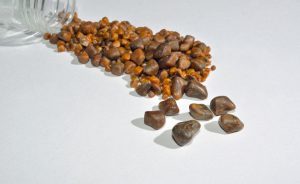 Gallbladder sludge may lead to gallstones in the elderly. Gallbladder sludge, also known as biliary sludge, is a gel-like bile, a potential precursor to cholesterol stones. In majority of cases, this sludge does not form into stones and can easily dissolve in the gallbladder.
Gallbladder sludge may lead to gallstones in the elderly. Gallbladder sludge, also known as biliary sludge, is a gel-like bile, a potential precursor to cholesterol stones. In majority of cases, this sludge does not form into stones and can easily dissolve in the gallbladder.
Biliary sludge is normal and can be detected through ultrasound. It contains sediments of calcium bilirubinate granules, cholesterol crystals, and mucus. Generally, gallbladder sludge is not a problem unless it is present for an extended period of time. If persistent or excessive, it could contribute to the formation of gallstones.
Causes and symptoms of sludge in gallbladder
Advertisement
Bile is constantly concentrating in the gallbladder. When water is removed, bilirubinate granules and cholesterol sediments remain. Mucus from the gallbladder lining then mixes with these sediments, but bodily processes ultimately clear out the sludge.
Gallbladder sludge is more commonly seen in pregnant women, as well as people on a strict diet or partaking in excessive fasting.
Gallbladder sludge is often symptomless, unless cholesterol stones are formed. In this case, a person will experience symptoms related to the stones, not the sludge. Sometimes, gallbladder sludge may lead to inflammation of the gallbladder, even when stones are not present.
Gallbladder sludge risk factors
 Women are at a greater risk for gallbladder sludge than men. Native Americans have also been found to have gallbladder sludge more often than other ethnicities. Other risk factors include being diabetic, being pregnant, having a critical illness, being overweight and then losing a substantial amount of weight, and having undergone an organ transplant.
Women are at a greater risk for gallbladder sludge than men. Native Americans have also been found to have gallbladder sludge more often than other ethnicities. Other risk factors include being diabetic, being pregnant, having a critical illness, being overweight and then losing a substantial amount of weight, and having undergone an organ transplant.
Gallstones and sludge in gallbladder
Most of us are probably living with sludge in our gallbladder at this present moment, but because it does not cause any symptoms we are unaware of it. The sediments in the gallbladder from the sludge can contribute to the formation of gallstones, which result in pronounced symptoms such as pain.
If the stones are small enough, they will easily pass through the body and either come with symptoms or end up being symptomless.
The only way to know for sure if you have gallbladder sludge is with an ultrasound or X-ray. In many cases, no treatment will be required, but your doctor will inform you of the possible risk of developing gallstones in the future.
Treatment options for gallbladder sludge
Advertisement
Gallbladder sludge does not require treatment unless it progresses to gallstones. To prevent gallbladder sludge, you should avoid losing excess weight quickly, avoid crash or fad diets, and consume plenty of fiber.
Treatment for gallstones includes taking pain-relieving medication, lithotripsy, inducing polyuria, and surgery.
Sources:
http://www.healthhype.com/gallbladder-sludge-biliary-causes-symptoms-flush-treatment.html
http://www.medicinenet.com/script/main/art.asp?articlekey=8402
http://www.everydayhealth.com/gallbladder/sludge-in-the-gallbladder.aspx
http://www.livestrong.com/article/288266-diet-for-gallbladder-sludge/
//www.belmarrahealth.com/gallstones-vs-kidney-stones-common-risk-connection-treatment-and-prevention/
